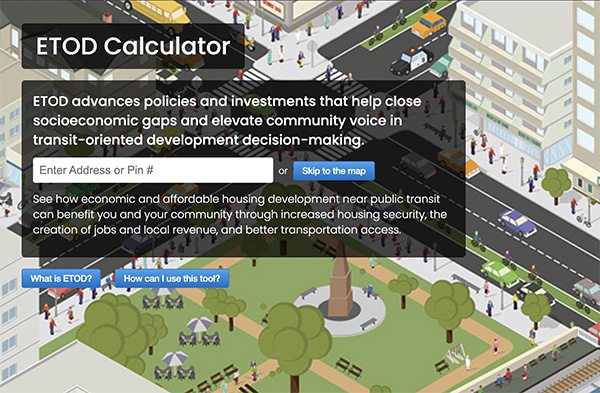
From Screen Time to Real Time: Understanding Southeast Side stories through today's oral histories
As data analysts and policy professionals, we spend a lot of time at our desks and behind screens, analyzing quantitative data, active or proposed policies and programs, and various written reports and documents. Much of what we analyze and review is -- or becomes -- an aggregation and anonymization of specific places, experience, and impacts, and fails to directly capture the intricacies of an individual’s lived experience. In our work with community-based partners, we’ve committed... Read the rest of this entry »
The Problems With the justice40 Screening Tool, and Some Ideas for How to Improve It
The Center for Neighborhood Technology (CNT) has been a strong supporter of the concept of Justice40 since its announcement in early 2021. The goal of this program is to direct at least 40% of the benefits of federal investment to communities that have historically been left behind. Defining those communities is critical, and the federal government attempted this with the release of the Climate and Economic Justice Screening Tool in February 2022. Generally, the federal definition of... Read the rest of this entry »
How Green Infrastructure Affects Home Values in New Orleans
Green stormwater infrastructure (GSI) is an important tool to build resilience to climate change but needs community support to be effective. In late February, as part of CNT’s continued work to examine the effect of GSI on property values, I joined Leslé Honoré, Managing Director of Strategy and Communications, to discuss this topic with the community of Gentilly in New Orleans. In partnership with Father Tony Ricard and St. Gabriel the Archangel Church, we had the incredible... Read the rest of this entry »
Authentic Collaboration: Critical to Equitable Outcomes
Little Village Environmental Justice Organization (LVEJO), an environmental justice (EJ) organization based in the Little Village neighborhood, and Center for Neighborhood Technology (CNT), a research and data analytic planning organization in Chicago, are creating a Geographic Information Systems (GIS) 101 Toolkit for EJ organizations to help them conduct basic mapping and analysis. Throughout toolkit development, the Milwaukee-based EJ organization Milwaukee Water Commons (MWC) is testing to... Read the rest of this entry »
Residents Participate in Urban Flooding Data Collection Efforts
The Urban Flooding Baseline Project seeks to clearly define the problem of urban flooding in the Calumet region using available quantitative data sources and first-hand pictorial data from residents to improve flood mitigation plans. At the end of July, we completed the Pilot and Phase 1 of the resident data collection. Each resident data collection leader is assigned a 1.5 mile x 1.5 mile region in the communities for Dolton, Dixmoor, Harvey, Markham, Phoenix, Posen, or Riverdale and is... Read the rest of this entry »
Public Transportation's Impacts on Greenhouse Gas Emissions
Public transportation is a climate solution, and CNT’s recent report for the Transit Cooperative Research Program (TCRP) shows what an important role it plays in controlling emissions nationwide. Public transit in the U.S. saved 63 million metric tons of carbon dioxide equivalent (MMT CO2e) emissions in 2018—the equivalent of taking 16 coal power plants offline for a year. The new report, TCRP Research Report 226: An Update on Public Transportation's Impacts on Greenhouse Gas... Read the rest of this entry »
Growing Community at LUCHA’s Tierra Linda House
It was raining – great for the new rain garden, but not so great for a community gardening day. Would anyone come? Hopeful, we set up the tents and laid out the sandwiches, and parents and youth started arriving a little after noon. "We were so thrilled that families and volunteers showed up, despite the morning rain! It was truly a great opportunity to bond with the community organizations that supported these efforts and the tenants and community members that will... Read the rest of this entry »
Update on the Campaign to Stop General Iron
On May 7th, Chicago Mayor Lori Lightfoot announced a decision to delay a decision on a permit that would allow General Iron to move to Chicago’s Southeast side, a predominantly Latinx and Black community, until further environmental analysis can be completed by the Chicago Department of Public Health. Environmental justice advocates, who engaged in a month-long hunger strike to stop General Iron’s relocation, are asking for a full denial of the permit. General Iron, a scrap metal shredder... Read the rest of this entry »
Why CNT is Supporting the Campaign to Stop General Iron
Today is Day 12 of a hunger strike led by activists on Chicago’s Southeast side to call attention to the relocation of a major industrial polluter to their community. General Iron, a scrap metal shredder that was repeatedly fined for environmental violations in its former home in Lincoln Park, is awaiting a final permit from the Chicago Department of Public Health to allow it to move its operations to the Southeast side. CNT strongly supports the campaign to stop General Iron, and we urge the... Read the rest of this entry »
Shouldering the Burden of an Accumulating Crisis
The COVID-19 pandemic has impacted communities around the world. However, Latinx, Black, Indigenous, and other communities of color have been disproportionately impacted due to existing social, environmental, and economic factors that make individuals more likely to have worsened COVID-19 outcomes. The Link between Land Use, Air, and COVID-19 Racialized land use and lending practices, such as redlining, have disproportionately located heavy industrial development near Black and... Read the rest of this entry »





 Strengthening Transit Through Community Partnerships
Strengthening Transit Through Community Partnerships
















 RSS Feed
RSS Feed